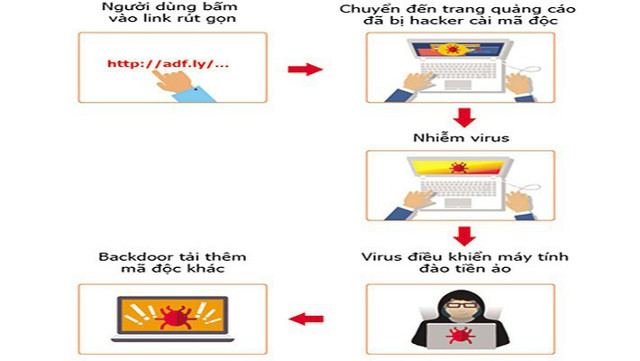Many computers in Vietnam have been hijacked due to virus infection
- After WannaCry, Petya's "blackmail" malicious code is raging, this is a way to overcome and prevent it
- How to identify WannaCry malicious code from Vietnam Computer Emergency Response Center (VNCERT)
- WannaCry is not dead yet, it just attacked Honda and Australia's traffic camera system
Recently, Bkav has issued a warning saying that thousands of computers in Vietnam have been hijacked by the new virtual money digging virus called W32.AdCoinMiner. Accordingly, the virus spreads through Adf.ly online advertising service and through software vulnerabilities, with the aim of hijacking a victim's computer to dig up virtual money to benefit them. Currently, there are more than 139,000 computers in Vietnam identified as being infected with the new virtual money digging virus W32.AdCoinMiner .
According to Bkav, Adf.ly is a service that allows users to shorten links (links) with integrated advertising services when sharing on social networking sites or Youtube. When users click on these shortened links, they will have to look through an advertisement page, then click Ignore the ad before seeing the main content of the link. Taking advantage of this vulnerability of the users, hackers took advantage of inserting malicious code into advertising pages to infect the user's computer. With this way of spreading viruses, it is difficult for the victims to take precautions, because they can still view the content from the shortened link. After the virus enters the computer, it begins to take control and use the victim's computer to dig virtual money.

Not only that, after gaining control of the computer, the virus also automatically downloads more malicious code from the hacker control servers, supporting the theft of personal information or victim's data. Easily.
Besides Adf.ly, hackers also take advantage of the SMB vulnerability to spread viruses on a large scale. The SMB vulnerability was once exploited by the WannaCry malware, infecting more than 300,000 computers in just a few hours. According to Bkav's statistics, more than half of computers in Vietnam exist this vulnerability.
Thanks to the lucrative resources of virtual money, hackers are constantly looking for ways to spread viruses into multiple computers to benefit them.
According to statistics from Bkav, in the first 3 months of 2018, there were 1,095 Vietnamese websites attacked by hackers, including 56 important websites of government agencies, educational organizations . Therefore, experts recommend Users should install some browser plug-ins to block JavaScript digging virtual money. Also do not download applications from unclear sources, "pirated" applications, cracking software. Installing reliable antivirus programs and updating the latest data is also recommended.
See more:
- Antivirus software is slowing down your PC
- Top 10 best Antivirus software in early 2018 for Windows 10
- Bkav 2018 uses artificial intelligence to detect viruses and protect computers
- Former NSA hacker turned Kaspersky antivirus software into a spy tool
You should read it
- ★ Hacker hijack CoinHive DNS to dig virtual money with thousands of websites
- ★ Asus produces virtual money digging boards that support up to 20 GPUs
- ★ History of digging a bitcoin, from a regular CPU to an ASIC system
- ★ Samsung produces dedicated chips to dig virtual money
- ★ New malware-digging tool on Linux devices